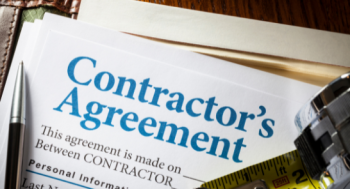Blog
Introducing CLOI: Your Ultimate Commercial Landlord Owners Insurance
Attention, commercial property owners! Are you ready to elevate your investment protection game? Say hello to CLOI—Commercial Landlord Owners Insurance—the comprehensive coverage designed to keep your property, income, and peace of mind secure.
... read moreCyber Safety, Simplified: The Essential Eight Principles
Discover the Australian Cyber Security Centre (ACSC’s) Essential 8 principles to safeguard your business from cyber threats. Learn how they can be part of your arsenal to protect your data, systems, and reputation.
Cyber Safeguard Your Future!
... read moreUnderstanding the Importance of Professional Liability Insurance for Consultants
In today's dynamic business landscape, consultants play a vital role in providing expertise, guidance, and strategic solutions to clients across various industries. Whether you're a management consultant, IT consultant, marketing consultant, building design consultant, or any other type of consultant, your advice and recommendations can significantly impact your clients' businesses. However, with this responsibility comes the potential for errors, omissions, or professional negligence that could lead to financial losses or legal disputes. This is where professional liability insurance, also known as errors and omissions (E&O) insurance, becomes essential.
... read moreThe Importance of paying premiums by the policy expiry date
As an insurance broker, we often receive inquiries from clients regarding payment terms for their insurance premiums. One common question is about the possibility of extending payment terms beyond the policy expiry date. It's important to understand why timely payment is critical and what steps need to be taken if an extension is required. This blog will shed light on these aspects and explain the potential consequences of delayed payments.
... read more10 Essential Tips for Buying Small Business Insurance
Get the coverage your small business needs with our top 10 insurance tips. We'll guide you through choosing the right policy and ensuring comprehensive protection.
... read moreRising Insurance Costs: Solutions for Home Builders
As insurance premiums rise, home builders face new challenges in managing costs. Learn practical strategies to navigate these increases & boost your risk management approach.
... read moreWhat you need to know about contractor liability Insurance
If your SME uses contractors, beware the risks and how to manage them. This article explains risk management approaches include customised insurance for your unique business.
... read moreThe Importance of Good Business Practices and Professional Indemnity Insurance
In the world of professional services, maintaining good business practices is not only essential for client satisfaction and reputation management but also for protecting your business through Professional Indemnity Insurance. Understanding the consequences of poor business practices and implementing robust procedures can save your business from financial and operational risks.
... read moreUnderstanding the Importance of Dilapidation Reports in Construction Insurance
As trusted insurance brokers serving the construction industry, we understand the complexities and challenges that builders face when arranging insurance coverage for their projects. One crucial aspect that often arises in certain types of construction projects is the requirement for dilapidation reports or building condition reports. In this blog post, we'll delve into what these reports entail, why they're necessary, and how they can protect builders from potential financial risks.
... read more5 Insurance Claims Aussie SMEs are Most Likely to Make
Find out about the five most common claims Aussie SMEs make on their insurance and how your business can reduce your risks. Protect your SME with better risk management & the right insurance coverage.
This article will also offer tips to improve your risk management, so you’re less likely to need to claim for any of these events.
... read moreEverything You Need to Know About Professional Liability Insurance
Learn about the importance of professional liability insurance (also known as professional indemnity insurance) and how it protects businesses from claims of negligence or errors in service provision. Understand the difference between professional indemnity and public liability insurance and why securing the right coverage is essential for business protection.
In the dynamic world of business, the term "professional liability insurance" often surfaces, but its significance may not always be clear. Let's delve into this crucial aspect of risk management and understand why it's essential for businesses of all sizes and industries.
... read moreHow to ensure you're getting full value out of your insurance broker or adviser
SMEs can optimise their risk management, earn discounts by policy packaging, save on claim time & more by using the expertise of a qualified insurance broker or adviser. Learn how your business could benefit.
... read moreCyber security named as the top risk for CEOs in 2024
Australian CEOs have spotlighted cyber security as their top risk for 2024. Here’s how SMEs can strengthen their risk-management approach to minimise cyber risks.
Know the emerging risks.
... read moreStrengthen Your Construction Insurance: Safeguarding Existing Buildings
Undertaking construction projects involves numerous risks, emphasizing the critical importance of robust insurance coverage. While your current construction and liability insurance policy may cover specific aspects outlined in your building contract, it's essential to understand that it may not extend coverage to existing buildings at the project site. This underscores the need for an additional layer of protection.
... read moreStop Your Tools & Equipment Going Walkies: Here’s How
Tradies’ tools and equipment are a hot target for thieves. These risk management tips, including appropriate insurance, will help protect your gear, including if your items have been damaged.
Tips to Secure your tools
... read moreSupply Chain Disruptions & Business Interruption Cover
Supply chain disruptions are imminent again with disasters and world conflict. How to mitigate your risks & learn more about when a business interruption insurance policy can help your business.
Become Supply Chain Resilient
... read moreSafeguarding Your Career: The Foundation of Your Professional Indemnity Insurance
When it comes to preserving your career and maintaining peace of mind as a building designer, there's no room for compromise.
That's why selecting the right Limit of Indemnity Sum Insured on your Professional Insurance Policy is paramount.
... read moreThe Importance of Run-Off Cover for Public & Products Liability
In the world of insurance, 'run-off coverage' is a vital but often overlooked term for businesses. This post delves into its importance, especially in products and public liability insurance.
... read moreMisconceptions about Landlord Insurance Debunked
Landlord insurance isn’t set and forget. Many landlords assume their policy covers them if the property is untenanted, for pet damage, short-term rentals, and that it matches the tenancy period.
... read moreRisk Management Tips for Australian Service-Based Businesses
SMBs offering services or advice can benefit from professional indemnity insurance to boost their risk management.
Having the right policy helps protect against a possible suite of claims.
... read moreDry Hire Insurance – what you need to know
When hiring out plant and machinery, it is important to have adequate insurance coverage in place to protect both the owner of the equipment and the person or company hiring it. If you are hiring out equipment without an operator (dry hire) there are several options to consider.
... read moreHow To Protect Your Business From Increasing Cyber Risks
Only a quarter of Australian businesses have cyber insurance, despite the rise of cyber attacks. Learn how to boost your risk management to protect your business from cyber threats.
Boost your Cyber Safety
... read moreBuilders’ Insurance: What Your Business Needs To Know
It’s a challenging environment for Australian builders, but you can help protect your business by bolstering your risk management. We explain the key insurance policies to consider.
... read more4 Ways To Check if Your SME Is Underinsured (and What To Do)
Small businesses can avoid costly mistakes in underinsuring their properties and assets. These tips will help in estimating, assessing risks & understanding policy limits to get the right coverage.
... read moreThe Role of Public Liability Insurance for Builders
Construction businesses need public liability insurance for protection against claims from third parties for injuries or property damage. Learn why builders and sub-contractors need separate policies.
... read morePrincipal Supplied Items - Beware!
Principal supplied items, also known as owner-furnished materials, are a type of coverage that can be included in an annual construction insurance policy.
... read moreUnpacking Contract Works Insurance for Aussie Builders
Contract works insurance can be a good fit for Aussie builders keen to manage the risks on their building projects. But policy coverage varies, with options including per project or annually.
... read moreHow management liability insurance gives your business more power
A management liability policy protects your company and its directors, managers, and officers against claims and costs resulting from mistakes management makes. Find out why your business is stronger when your managers’ risks are covered.
... read moreDoes Your Insurance Cover All of These Construction Risks?
Construction risks are increasing, so it’s worth checking that your insurance covers your business needs in the current environment. We also explain how to minimise these risks.
... read moreWhat you Risk if Your Home is Underinsured
Eight in 10 Australians underinsure their homes, according to ASIC. These are the risks of underinsurance and what you can do to ensure your home is properly protected.
... read moreHow to Handle your Management Liability Risks Better
Business owners, directors, officers, and managers are all exposed to management liability, no matter the size of their business. Manage these risks with insurance tailored to your unique needs.
... read more5 Top Tips about Landlord Insurance
Having landlord insurance isn’t a set-and-forget policy for property investors to protect their investment. Here are five tips to overcome common misconceptions about what landlord insurance actually covers.
... read more5 Important Facts About Professional Indemnity Cover
There's much more to professional indemnity insurance (PI) than meets the eye.
The article unpacks five common misconceptions about the protection PI offers (or not, as is often the case).
... read more
Not the same: Employee vs. Independent Contractor
Your business can avoid extra risks, liabilities and penalties by understanding and abiding by the legal differences between an employee and an independent contractor. This article offers you a guide.
... read moreKnow your Obligations as a Commercial Property Owner
Leasing your commercial property can deliver higher yields, but comes with a range of responsibilities, including regulatory and legal ones. Here are the top four responsibilities explained.
... read moreYour Top-Notch Checklist To Stop Tool Theft
As a tradie, you know trying to operate without the tools of your trade is impossible.
While you may already have an excellent security system in place, it's easy to let things slip and not implement the latest technology and updates in theft prevention.
... read moreNeed To Claim Flood Damage For Your Business? Use These Tips
When a flood hits, staying safe and finding headspace to claim on your insurance for damage can be stressful. Improve your chances of a quick and fair resolution by following these tips.
... read moreWhat's Covered with Business Interruption Polices
Business interruption policies have been under the spotlight, with insurance claims hitting the courts. This article updates you on what’s covered and what’s not so you can better manage your business risks.
... read moreBusiness checklist before you close for the holidays
This handy checklist will take the stress out of preparing your business for the upcoming Christmas closure, so you can return refreshed and ready for a more successful year.
... read moreAre you aware of the biggest commercial landlord risks?
While commercial landlords enjoy a return of up to 12% on their investment, the risks are higher than for residential property. Find out how to manage the biggest risks of owning a commercial property.
... read moreMust-have cover for builders and the construction industry
Tighter regulations and increasing risks mean there are several must-have insurance policies for the construction industry. Find out more about each and why they’re essential for your business.
... read moreGet up to speed on commercial property insurance
You may know it as commercial building or business property insurance. Common among those titles is that it’s for non-residential properties – factories, warehouses, shopping centres, and whole unit and apartment blocks.
... read moreHere’s how to avoid the most common construction risks
The average person might be surprised by how many risks confront construction businesses. But we’re here to help you identify and manage them.
... read moreYour guide to landlord rights and regs around Australia in 2021
About one in ten of us are landlords, compared with one in 15 about two decades ago. And, the latest Census shows about a third of Australian households (2.6 million, to be specific) rent.
... read moreHow increasing building costs could mean you’re now underinsured
Most people are aware inflation has been on the rise in recent months due to COVID-19 impacts. However, many are not aware of how significant the impact has been on the construction sector and what that means for their property insurance. As a result, the gap between what most people are insuring their properties for and the true cost of rebuilding is currently unusually large. Read on to learn more.
... read moreWhat you need to know about the claims process
No business wants nasty surprises. So, when an adverse incident means you need to claim on your insurance policy, we will manage the process on your behalf.
Our expertise will help save you time, money, and stress. In fact, a Deloitte report found brokers/advisers save their clients on average 11 hours a year, not just with faster claims receipts, but also with practical risk advice and customising insurance policies to business needs.
Here’s a six-step overview of what happens from go to whoa once we lodge a claim for you.
... read moreChanges ahead: getting and maintaining registration for Design and Building Practitioners working on Class 2 buildings in NSW.
Changes are coming for the building and design sector as part of the NSW Government’s response to the Shergold Weir Building Confidence Report. Aimed at strengthening compliance in the building sector, the changes have come about following a string of construction disasters and failures in high-rise apartment buildings.
... read moreChanges to the residential building industry in NSW: Class 2 building industry reforms
Long awaited changes are coming to the residential building industry.
In the wake of construction disasters and significant failures in building standards in high-rise apartments in recent years, the initial changes focus on Class 2 buildings.
... read moreInsuring your whole business? Is that even possible?
Wouldn’t it be simpler and easier if you could insure your whole business with a single policy? Here's how.
... read more
Are you doubling up if you have builders' risk and general liability insurance?
With builders’ risks escalating and an increasingly tougher regulatory environment across Australia, how can construction contractors protect against potential liabilities and losses?
... read moreNSW Draft Design and Building Practitioners Regulation: are you ready to declare?
The NSW Government's draft Design and Building Practitioners Regulation 2020 outlines rigorous reforms that will affect design practitioners and builders who work on multi-storey residential building projects.
In order to provide you with up-to-date information to help you understand the upcoming changes in NSW we have sourced the following article from leading Australian law firm Clayton Utz.
Why construction businesses need professional indemnity insurance
There’s a lot at risk if you’re running a construction business in Australia.
Increasingly, professional indemnity (PI) insurance is a must-have for construction professionals. Should you already have this cover, have you checked if the policy adequately protects you now and into the future?
... read moreLandlord insurance demystified in under 3 minutes
Has COVID-19 made you unsure about managing the risks of owning an investment property? This article will update you on what landlord insurance will and won't cover in light of COVID-19. And, a forewarning, there are a lot of grey areas.
Landlord insurance is shorthand for building, contents or rental cover, or a mix of these for a property you rent out. The 'contents' in the property you rent out are the fixtures such as carpet and floor coverings, light fittings, appliances and window coverings. This doesn't cover your tenants' possessions.
... read moreHeavy commercial transport: what could possibly go wrong?
Heavy commercial transport helps keep our economy running smoothly, but there's a lot that can go wrong if you're running a transportation business.
... read moreWhat is Commercial Legal Protection cover?
Commercial Legal Protection is designed to help SME businesses deal with unexpected legal issues not already covered by their other insurance policies. Intended to complement traditional SME policies, rather than substitute core insurance cover, the policy provides expert legal assistance when an insured really needs it and protects them from potentially crippling costs which will have to be incurred, regardless of any fault on the client’s part.
... read moreEmpty building or business? Here's how to manage your risks
Why your empty business or building could be a surprising insurance risk for you.
... read moreWorkplace manslaughter offences: could your business defend itself?
In 2019, WorkSafe Victoria reported there were over 27000 claims for injured workers, and sadly 24 workplace fatalities occurred in the state. The tragedy of one person losing their life on the job has a longstanding effect on family, colleagues and friends, so even one workplace death is too much. As a result, new laws have been created to assist in preventing workplace death. Because everyone Australian worker has the right to go home safely to their loved ones at the end of a workday.
... read moreBuilding Designer Registration in NSW: Everything you need to know
Over the coming months, we will be producing a number of articles to fully brief you on the upcoming introduction of Registration of Building Designers (and other symbiotic Building Professionals) in New South Wales (NSW), and the national push for consistent Australia wide Registration of Building Professionals.
... read moreBuilders’ Insurance – why you should consider annual policies
Builders come in all shapes and sizes. And not just physically.
It doesn’t matter if you’re an owner/builder, builder, sub-contractor, employ two people or have 2000 employees relying on you, you need to have the correct insurance in place.
As builders and their projects are all different, so are the insurance packages on offer.
Not sure what to do? We’ve put on our safety hats and we’re here to help
... read moreDry Hire Insurance and how to ensure you're covered
Does your business hire out equipment? You know that the potential loss or damage to your machinery and equipment will be costly, so making sure you have suitable insurance for your dry hire business is extremely important.
... read moreWorking from home - are you covered?
Right now, working from home has become the new norm. We understand you’ve got a lot on your plate – you may suddenly be sharing a workspace with your partner. Have kids at home. Are having trouble getting basic items for your family. And you may even have unexpected money issues.
That’s why it’s more important than ever to ensure your home and contents insurance policy will cover your changed circumstances.
... read moreWhy Professional Indemnity Insurance is vital for builders
Are you unnecessarily exposing your business to potential losses and legal action if any issues arise with a property you have built? While you likely have some insurance in place, are you sure you have the right cover? Because when it comes to the construction of a property, even if other contractors are involved, you as the builder have the closest relationship with the client. In their eyes, the buck stops with you.
... read moreUnderstanding claims made polices and run off cover
These days, anyone running or operating a business may need several different types of insurance policies to help manage the risks connected with their business. While different types of policies may seem similar, the trigger for a policy to become active may differ.
If you have Professional Indemnity (PI) Insurance - which covers you for claims by others for negligence, errors and omissions in the delivery of your professional services - you may not be aware they are what is referred to as a ‘claims made’ policy as opposed to ‘claims occurring’.
What this means is that your policy is triggered by a claim being made against you during the period of insurance. To ensure you are covered, you must have a policy in force on the date on which the claim is being made.
... read moreDo you have enough insurance for your small business?
Underinsurance remains a serious issue for small businesses, with the Insurance Council of Australia’s (ICA) statistics showing 12.8 per cent of small businesses and 24 per cent of sole traders have no insurance.
... read moreLandlord Insurance at a glance
Like home insurance, landlord insurance can cover your rental property and its contents against risks like storms, floods, and fire. It can also cover the damage that tenants can cause to your contents - and even loss of rental income.
... read moreStrata Insurance at a glance
If you own a townhouse, unit or apartment and you're sharing common space with others, you don't want to be left to foot the bill if there's damage to shared parts of the building or items. Strata Insurance protects the building and common areas or facilities, with the premiums paid for by the owners' corporation.
... read moreProfessional Indemnity Insurance at a glance
Anyone can make a mistake - but if your business is found liable for negligence, the costs can be financially devastating. Not only can it lead to an expensive lawsuit, but your business's hard-earned reputation may be damaged as a result.
... read moreMarine Transit Insurance at a glance
Marine transit insurance is important for businesses involved in shipping or receiving goods, operating watercraft commercially, repairing vessels, running a marina and more.
... read moreMotor Insurance at a glance
If your car is damaged in an accident where you're at fault, having comprehensive motor insurance helps to pay for repairs - or can replace it altogether if your car is written off.
... read morePublic & Products Liability at a glance
If an accident or unforeseeable incident causes damage or injury to someone (other than your employees), you may be found legally liable to cover the costs.
Public liability insurance can help to protect your business from the financial risk of liability claims - giving you the certainty you need to trade with confidence.
... read moreHome & Contents Insurance at a glance
If your home and its contents were damaged or destroyed in a natural disaster or accident, or all your valuables were stolen, could you afford to replace them?
... read moreCorporate Travel Insurance at a glance
When business travel doesn't go to plan, Corporate Travel Insurance can help to cover out-of-pocket costs to your business and employees.
... read moreCyber Protection Insurance at a glance
Cyber Protection Insurance is a relatively new form of cover. It's designed to help protect your business from the financial impact of computer hacking or data breach.
... read moreContract Works Insurance at a glance
When you're working on a construction site, plenty of things can go wrong. Damage or loss to a building could cost you time, money and even your reputation. Meanwhile, an onsite injury can result in considerable pain, stress and financial loss.
... read moreManagement Liability Insurance at a glance
When you're running a business, you may be personally liable for any actual or alleged breaches of the Corporations Act.
And it's not just large companies that are exposed - small and medium business owners and officers could be at risk as well.
... read moreBusiness Insurance at a glance
A business takes years to build - but an accident or disaster could destroy it all in minutes. That's why businesses should help protect themselves with a quality business insurance pack.
... read moreUnderstanding copyright for architects and building designers
There’s a common saying imitation is the sincerest form of flattery. But when it comes to building design, where considerable time and effort has been put in, the last thing you want to see is a replica of your work produced by someone else.
That’s why copyright is so important to the building industry. It ensures your rights are protected.
How can you ensure that your designs, drawings and plans are protected? And what can you do to avoid infringing on someone else’s designs? We take a look at what you should know when it comes to copyright for architects and building designers.
... read moreWhy is it important to list all business activities on your insurance policy?
When it comes to your insurance, you need to make sure that not only do you have the correct policies set up, but they are tailored to cover your particular needs.
... read moreWhat insurance do contractors and sub-contractors need?
As a business owner, hiring a contractor or sub-contractor can be handy for seasonal peaks or one-off projects. A contractor means any person or business you hire on a contractual basis and is not your employee.
... read moreWhy you need to have the right entities as named insured on your Policy
When it comes to a liability policy, you want to make sure there’s no easy reason for an insurer to decline indemnity. One of the most common issues we see is not getting the name insured right on a policy.
You’d think it would be simple, right? But a lot of businesses need help in ensuring all trading entities are noted as insured on the policy schedule.
... read moreWhen to provide your Professional Indemnity Insurance Policy
Professional Indemnity Insurance provides protection for a legal liability to defend yourself against an actual or alleged error or omission in your work.
It can protect your business and reputation against a range of claims including errors in council submissions, lost documentation, inadequate advice, and acting without proper instructions from your client.
While it’s an important insurance for building designers, architects and other types of building professionals and consultants to have, at times it can be confusing when you should or shouldn't provide evidence of having this insurance for your business.
In this article, we look at the different requirements for Professional Indemnity Insurance as well as the instance for when you should produce your policy if you are asked for it.
... read moreCommercial Landlord Insurance - don't rely on a tenant to protect your assets
It’s common in commercial real estate leasing for a tenant to pay various outgoings related to the building and its use for the term of their tenancy. But is it a good idea to leave the responsibility of insurance coverage to them as well?
... read more
Non-Compliant Building Materials - Professional Indemnity Insurance Exclusion
You may have heard in the media the many issues relating to the dangers of Non-Compliant Building Materials in particular flammable cladding and the flow on effect this has to Professional Indemnity Insurance Policies. Due to these issues, (such as the cladding building fires in London and Docklands) many of the insurers have reacted by adding policy cover exclusions regarding to claims arising from non-compliant building materials and the insurers are also raising their premiums.
... read moreProfessional Indemnity Insurance - Tips & Traps for Contracts
P.I. Insurance: tips and traps for construction contracts, If you need assistance with contracts please contact cgib and your account manager will advise you on services we can offer.
... read moreDomestic Warranty Insurance - Process & Application Tips
We would like to provide you with an update on the DBI product, process and how we can assist you obtain the Insurance.
... read more

























































































